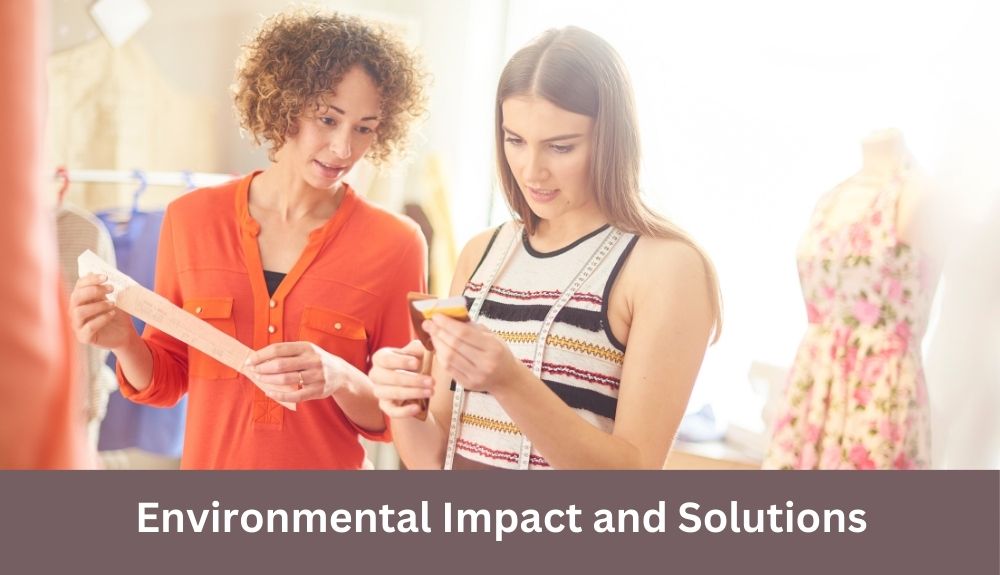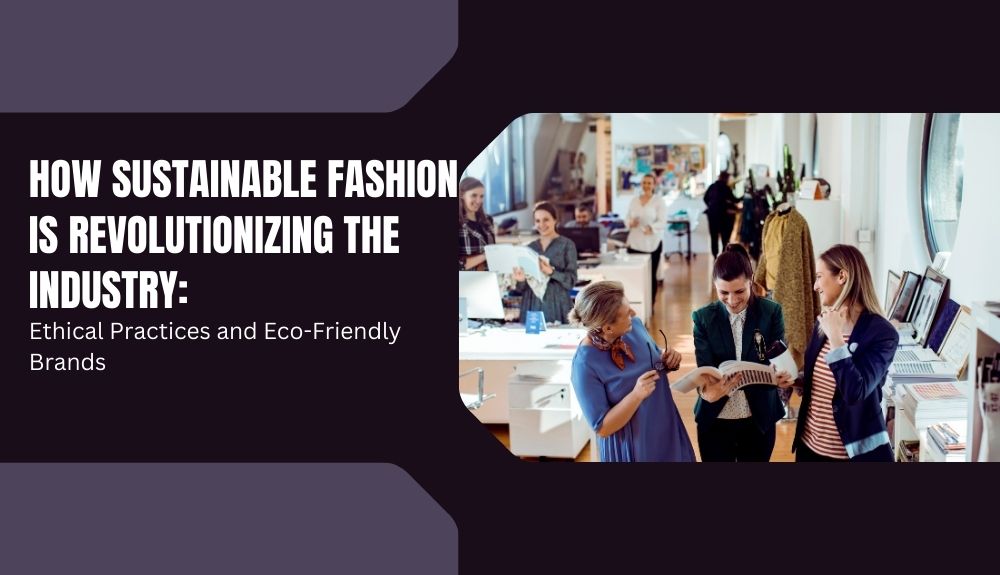How Sustainable Fashion is Revolutionizing the Industry: Ethical Practices and Eco-Friendly Brands
The fashion industry is undergoing a transformative shift towards sustainability, with ethical practices and eco-friendly brands leading the way. As consumers become increasingly aware of the environmental and social impact of their fashion choices, there is a growing demand for more sustainable options. In response, brands are embracing eco-friendly materials, implementing transparent supply chains, and educating consumers about their production processes.
But what exactly is sustainable fashion and how is it revolutionizing the industry? This blog explores the rise of sustainable fashion, delving into the ethical practices and innovative approaches adopted by eco-friendly brands. From the use of eco-friendly textiles like bamboo and recycled fabrics to the development of revolutionary technologies such as bacteria-based dye, the fashion industry is making significant strides towards a greener future.
Join us as we explore the latest trends, successful examples, and the environmental impact of the fashion industry. Discover how sustainable fashion is not just a passing trend but a fundamental shift towards a more responsible and conscious approach to fashion. Together, let’s embrace the revolution of sustainable fashion and make a significant impact on the industry and the planet.
Introduction to Sustainable Fashion
Sustainable fashion is not just a passing trend; it is a movement that aims to transform the fashion industry into a greener and more ethical one. With growing concerns about environmental issues and social responsibility, sustainable fashion has gained significant traction in recent years. It encompasses various practices that focus on minimizing the negative impact of the fashion industry on the environment and promoting fair labor practices.
In the past, the fashion industry has been notorious for its harmful effects on the planet. From excessive water consumption and pollution to the use of hazardous chemicals and exploitation of workers, the industry’s practices have drawn criticism. However, sustainable fashion seeks to address these issues by embracing eco-friendly materials, promoting transparency and accountability, and fostering conscious consumerism.
One of the key aspects of sustainable fashion is the emphasis on the entire life cycle of a garment. It starts from the sourcing of raw materials, which involves using organic or recycled fibers and reducing reliance on traditional fabrics that contribute to environmental degradation. Sustainable fashion brands also prioritize ethical manufacturing processes, ensuring safe and fair conditions for workers and fostering a responsible supply chain.
By adopting sustainable practices, the fashion industry aims to reduce its carbon footprint, conserve natural resources, and support the local communities involved in the production process. The rise of sustainable fashion reflects a shift in consumer preferences, with greater demand for eco-friendly and socially responsible products.
In the following sections, we will delve deeper into the rise of ethical practices, explore the role of eco-friendly brands, discuss the environmental impact of the fashion industry, and highlight the latest trends in sustainable fashion. Join us on this journey as we uncover the exciting developments and the potential for a more sustainable and ethical future in the fashion industry.
The Rise of Ethical Practices
As consumer awareness of the environmental and social impact of the fashion industry grows, there has been a significant shift towards embracing ethical practices. Brands are recognizing the importance of sustainability and are taking steps to incorporate them into their manufacturing processes. Here are some key trends and initiatives driving the rise of ethical practices in the fashion industry:
Transparency and Supply Chain Traceability
Consumers are increasingly demanding transparency from fashion brands, wanting to know where their clothes are made and under what conditions. To meet this demand, brands are adopting supply chain traceability to provide clarity on the origins of their products. By partnering with suppliers that uphold ethical standards and ensuring fair labor practices, brands can build trust with consumers and demonstrate their commitment to responsible sourcing.
Sustainable Materials and Manufacturing
In an effort to reduce their environmental impact, fashion brands are turning to sustainable materials and adopting eco-friendly manufacturing processes. This includes using organic or recycled fabrics, reducing water and energy consumption, and minimizing waste. By embracing these practices, brands are not only reducing their carbon footprint but also setting a positive example for the industry as a whole.
Fair Wages and Ethical Labor Practices
One of the key components of ethical fashion is ensuring fair wages and safe working conditions for garment workers. Brands are increasingly focusing on improving the lives of those involved in the production process by partnering with suppliers that prioritize fair treatment and provide a living wage. This creates a more equitable fashion industry and helps to combat issues such as exploitation and labor rights violations.
Collaborations and Education
To further promote ethical practices, brands are increasingly collaborating with non-profit organizations and industry initiatives. These collaborations aim to raise awareness about the importance of sustainability and educate both brands and consumers about the impact of their choices. By sharing knowledge and resources, the industry as a whole can work towards a more ethical and sustainable future.
Consumer Demand and Advocacy
Perhaps the most influential factor driving the rise of ethical practices is the increasing demand from consumers for sustainable and ethical fashion. As consumers become more informed about the environmental and social impact of the fashion industry, they are actively choosing to support brands that align with their values. This shift in consumer behavior is pushing brands to reevaluate their practices and prioritize sustainability in order to meet the growing demand.
In conclusion, the fashion industry is experiencing a significant rise in ethical practices, driven by growing consumer awareness and demand. Brands are embracing transparency, sustainable materials, fair labor practices, and collaborations to create a more responsible and sustainable fashion industry. By prioritizing ethical practices, the industry can pave the way for a greener future.
Eco-Friendly Brands Leading the Way
In the midst of the fashion industry’s evolution towards sustainability, there are several eco-friendly brands that are leading the way with their commitment to sustainable practices. These brands are not only creating stylish and trendy products, but they are also taking significant steps to minimize their environmental footprint and promote ethical fashion.
Commitment to Sustainable Materials
Eco-friendly fashion brands understand the importance of using sustainable materials in their production processes. They prioritize materials that have a lower environmental impact, such as organic cotton, recycled fabrics, and innovative materials like Tencel™, made from sustainably sourced wood pulp. By embracing eco-friendly materials, these brands are reducing their reliance on traditional fabrics that require large amounts of water and energy, while also reducing the demand for harmful chemicals used in textile production.
Ethical Supply Chains
One of the key aspects of being an eco-friendly fashion brand is ensuring an ethical supply chain. These brands work closely with their suppliers to ensure fair wages and safe working conditions for garment workers. They prioritize transparency and traceability, providing information about the origin of their materials and the production processes involved. By working with suppliers who share their values, these brands are ensuring that every step of the production process is aligned with their commitment to sustainability.
Innovative Approaches and Revolutionary Technologies
Eco-friendly brands are at the forefront of embracing innovative approaches and revolutionary technologies to reduce their environmental impact. For example, some brands are exploring the use of bacteria-based dye technology, which eliminates the need for harmful chemicals and reduces water consumption. Others are incorporating smart fabrics that have built-in properties to regulate body temperature or repel odors, reducing the need for excessive washing and extending garment longevity. These innovations not only benefit the environment but also present exciting developments in the fashion industry.
Social Impact and Philanthropy
Many eco-friendly brands go beyond focusing solely on the environment and also consider the social impact of their operations. They actively support local communities and artisans by providing fair trade opportunities and preserving traditional craftsmanship. Additionally, some brands allocate a portion of their profits to non-profit organizations that support environmental and social causes, showcasing their commitment to making a positive difference beyond their own business.
Leading by Example
By embracing eco-friendly practices, these brands are setting an example for the rest of the fashion industry. They demonstrate that it is possible to create fashionable and desirable products while also prioritizing sustainability. Moreover, they inspire and educate consumers about the importance of making conscious choices when it comes to fashion consumption.
In conclusion, eco-friendly fashion brands are leading the way by prioritizing sustainability in every aspect of their operations. From using sustainable materials to ensuring ethical supply chains and embracing innovative technologies, these brands are setting new standards for the industry. By supporting these brands, consumers can contribute to the movement towards a more sustainable and ethical fashion future.
Environmental Impact and Solutions

The fashion industry has long been associated with unsustainable practices that have a significant negative impact on the environment. From excessive water consumption and pollution to greenhouse gas emissions, the industry is responsible for a range of environmental issues. However, there are solutions and strategies that can be implemented to mitigate these impacts and pave the way for a more sustainable future.
Water Pollution
Water pollution is a major concern in the fashion industry, primarily due to the use of hazardous chemicals and dyes in the production process. These substances, when released into water bodies, can contaminate local ecosystems and harm aquatic life. To address this issue, brands are increasingly adopting eco-friendly dyeing and finishing techniques that minimize water pollution. Additionally, wastewater treatment plants are being implemented to treat and detoxify the effluents generated during the manufacturing process.
Greenhouse Gas Emissions
The fashion industry is also a significant contributor to greenhouse gas emissions, largely due to the energy-intensive production processes and the transportation of goods across the globe. To reduce these emissions, brands are implementing measures such as switching to renewable energy sources in their manufacturing facilities, optimizing transportation routes to reduce carbon footprint, and embracing circular economy principles that prioritize recycling and upcycling.
Sustainable Material Choices
Another key solution is the use of sustainable materials in fashion production. Traditional fabrics like cotton require vast amounts of water and pesticides, contributing to environmental degradation. Brands are now turning to alternatives such as organic cotton, hemp, bamboo, and recycled fibers, which have a significantly lower environmental impact. Additionally, innovative technologies are being developed to create fabrics from sustainable sources, such as bacteria-based dye technology and smart fabrics that improve energy efficiency.
Ethical Supply Chains
Implementing ethical supply chains is crucial for a more sustainable fashion industry. Brands are increasingly focused on ensuring fair wages and safe working conditions for garment workers, as well as supporting local communities and promoting social impact. By working closely with suppliers and manufacturers, companies can ensure transparency and accountability throughout the production process.
Consumer Awareness and Education
Consumer awareness and demand play a vital role in driving the fashion industry towards more sustainable practices. As individuals become more conscious of the environmental and social impact of their purchasing choices, they can support sustainable fashion brands and make informed buying decisions. Education campaigns and initiatives are essential to empower consumers with the knowledge to identify and choose sustainable options.
In conclusion, the fashion industry has a significant environmental impact, but there are solutions and strategies being implemented to mitigate these effects. Through measures like reducing water pollution, minimizing greenhouse gas emissions, using sustainable materials, and promoting ethical supply chains, the industry is moving towards a more sustainable approach. Furthermore, consumer awareness and education are key drivers of change. By supporting eco-friendly fashion brands and making conscious buying decisions, individuals can contribute to a greener and more ethical future for the industry and the planet.
Consumer Awareness and Demand
The increasing demand for sustainable fashion is a clear indicator of a shifting consumer mindset towards more ethical and environmentally conscious choices. As consumers become more aware of the detrimental impact of the fashion industry on the planet and its people, they are actively seeking out brands that align with their values.
Educating Consumers
One of the driving forces behind the rising demand for sustainable fashion is increased consumer awareness. People are now more informed about the social and environmental issues associated with fast fashion, such as exploitation of garment workers and excessive waste. They are actively seeking information about sustainable practices and are becoming more conscious of the choices they make.
Ethical Factors
Consumers are increasingly seeking out brands that prioritize ethical practices throughout their supply chains. They want to know that the garments they purchase were made under fair working conditions and using sustainable materials. Brands that adopt transparent sourcing methods, engage in fair trade practices, and support artisans and local communities are gaining traction among conscious consumers.
Environmental Impact
Understanding the environmental impact of the fashion industry has spurred consumers to demand change. The production processes of traditional fashion often contribute to pollution, waste, and the depletion of natural resources. Sustainable fashion brands, on the other hand, strive to minimize their carbon footprint, reduce water consumption, and utilize eco-friendly materials, such as organic cotton, recycled fabrics, and innovative alternatives like bamboo or mushroom leather.
Influence of Social Media
Social media plays a significant role in driving consumer awareness and demand for sustainable fashion. Platforms like Instagram and Pinterest have become powerful tools for sharing information and inspiring sustainable fashion choices. Influencers and content creators actively promote eco-friendly brands and educate their followers about sustainable fashion options, encouraging them to make more conscious purchasing decisions.
Price Considerations
While it is true that some sustainable fashion brands may come with a higher price tag, the increasing demand has also led to the emergence of more affordable options. As the market grows, brands are finding innovative ways to reduce costs without compromising on ethical and sustainable practices. Additionally, consumers are recognizing that the higher upfront cost of sustainable fashion is often offset by its durability and longevity.
In conclusion, consumer awareness and demand for sustainable fashion have grown significantly in recent years. Consumers, armed with knowledge about the environmental and social impact of the fashion industry, are driving the demand for more ethical practices and eco-friendly materials. Through their choices, they are pushing the industry towards a more sustainable future.
Latest Sustainable Fashion Trends
Sustainable fashion is not only about reducing the environmental impact but also staying stylish and up-to-date with the latest trends. In recent years, the industry has witnessed exciting developments in eco-friendly materials and revolutionary technologies. Here are some of the latest sustainable fashion trends to watch out for:
1. Eco-friendly Materials
Fashion brands are increasingly turning to eco-friendly materials that minimize harm to the environment. Organic cotton, bamboo, hemp, and recycled fabrics are gaining popularity due to their sustainable production processes and reduced use of harmful chemicals. These materials offer a greener alternative to traditional fabrics, without compromising on style or quality.
2. Innovative Design
Sustainable fashion has sparked a wave of innovation in design techniques. Brands are experimenting with techniques such as zero-waste patterns, upcycling, and modular designs to minimize fabric waste and maximize the use of resources. This approach not only reduces environmental impact but also results in unique and visually appealing garments.
3. Garment Longevity
The slow fashion movement encourages consumers to invest in high-quality, timeless pieces that are designed to last. Brands are focusing on creating durable clothing with careful attention to craftsmanship and quality. By choosing garments with longevity, consumers can minimize their contribution to the fashion industry’s waste problem.
4. Technological Advancements
Revolutionary technologies play a crucial role in advancing sustainable fashion. From 3D printing to digital pattern-making, these innovations enable efficient production processes and reduce waste. Additionally, advancements in bacteria-based dye technology offer a more environmentally friendly alternative to traditional dyeing methods.
5. Ethical Supply Chains
Consumers are increasingly demanding transparency and ethical practices from fashion brands. As a result, many companies are adopting supply chain practices that prioritize fair wages, safe working conditions, and responsible sourcing. This shift towards ethical supply chains ensures that fashion has a positive social impact while being environmentally sustainable.
Sustainable fashion trends are continually evolving as the industry seeks to address the environmental and social challenges of the fast fashion model. By embracing eco-friendly materials, innovative design, and ethical practices, fashion brands are paving the way for a greener and more responsible future.
Remember, by supporting sustainable fashion, you can make a significant impact on both the industry and the planet.
The Role of Social Media
Social media has played a significant role in promoting sustainable fashion and raising awareness among conscious consumers. With its widespread reach and influence, platforms like Instagram, Facebook, and TikTok have become powerful tools for fashion brands to showcase their sustainable practices and engage with their audience.
Building a Sustainable Community
Social media has allowed sustainable fashion brands to connect directly with their target audience, forming a community of like-minded individuals who are passionate about ethical fashion and environmental responsibility. Through engaging content and meaningful storytelling, brands can share their values, visions, and initiatives, fostering a sense of belonging among consumers who prioritize sustainability.
Amplifying Brand Messaging
By leveraging social media platforms, sustainable fashion brands can amplify their brand messaging and educate consumers about the importance of conscious purchasing decisions. They can highlight their use of eco-friendly materials, ethical supply chains, and manufacturing processes that minimize environmental impact. Through visually compelling images and videos, brands can showcase their commitment to sustainability, inspiring others to make more conscious fashion choices.
Influencer Partnerships
Social media influencers have become instrumental in promoting sustainable fashion brands. Collaborating with influencers who align with their values and target audience allows brands to reach a broader audience and increase their visibility. Influencers play a crucial role in showcasing sustainable fashion in an authentic and relatable way, making it more accessible and appealing to their followers.
Crowdsourcing Sustainable Solutions
Social media platforms provide a space for dialogue and idea-sharing. Sustainable fashion brands can actively involve their audience in discussions about sustainability, engaging them in conversations about innovative solutions and the future of fashion. By crowdsourcing ideas and feedback, brands can foster a sense of co-creation and make their consumers feel valued, thereby strengthening their commitment to supporting sustainable fashion.
Inspiring Conscious Consumerism
The power of social media lies in its ability to inspire and influence. Sustainable fashion brands leverage their platforms to educate consumers about the detrimental impacts of fast fashion and the benefits of opting for ethical alternatives. By showcasing the beauty and uniqueness of sustainable fashion, they empower consumers to make informed choices, promoting a shift towards a more ethical and environmentally responsible fashion industry.
In conclusion, social media is an integral part of the sustainable fashion movement, enabling brands to raise awareness, educate consumers, and inspire change. With its vast reach and influential capabilities, social media has the potential to reshape the fashion industry and drive it towards a greener and more conscious future.
Moving Towards a Greener Future

In our quest for a greener and more sustainable future, the fashion industry plays a pivotal role. Embracing sustainable practices is no longer an option but a necessity to mitigate the detrimental impact of the fashion industry on the environment. By reimagining manufacturing processes and adopting innovative approaches, brands can lead the way towards a more environmentally responsible future.
Embracing Sustainable Practices
The first step towards a greener future is the adoption of sustainable practices throughout the fashion supply chain. This includes using eco-friendly materials, reducing waste in production, and promoting ethical sourcing and manufacturing. By working towards a closed-loop production process, where resources are recycled and reused, brands can minimize their environmental footprint.
The Power of Consumer Choice
Consumer awareness and demand have a significant impact on the fashion industry and the planet. As more people become conscious of the environmental and social implications of their choices, the demand for sustainable fashion continues to grow. By supporting brands that prioritize ethical and sustainable practices, consumers can drive the industry towards positive change.
Technological Advancements
Technological advancements offer exciting developments in sustainable fashion. From smart fabrics that adapt to changing environments to revolutionary dyeing techniques using bacteria-based dyes, innovation plays a crucial role in reducing the industry’s environmental impact. Embracing these innovative solutions can lead to a more sustainable and responsible approach to fashion.
Collaboration and Education
Creating a greener future requires collaboration and knowledge sharing across the industry. Brands, manufacturers, and consumers must come together to exchange ideas, best practices, and innovations. Educational initiatives that raise awareness about the fashion industry’s impact can also empower individuals to make more informed choices and support sustainable brands.
A Fundamental Shift
The fashion industry has the potential to undergo a fundamental shift towards sustainability. By prioritizing ethical business practices, embracing eco-friendly materials, and minimizing waste, brands can create a more sustainable and socially responsible fashion ecosystem. Together, we can work towards a future where fashion not only looks good but also does good for the planet and its people.
Conclusion
In conclusion, sustainable fashion has emerged as a powerful movement within the fashion industry, advocating for a greener and more ethical future. Throughout this article, we have explored the rise of sustainable fashion, highlighting the importance of ethical practices and the growing number of eco-friendly brands leading the way. It is evident that the fashion industry is recognizing the need for change and is embracing sustainable manufacturing processes, from using eco-friendly materials to promoting transparency in their supply chain.
The environmental impact of the fashion industry cannot be ignored, with issues such as water pollution and greenhouse gas emissions posing significant challenges. However, solutions are being implemented, including the adoption of innovative technologies and the promotion of circularity, which aim to reduce waste and preserve resources.
Consumer awareness and demand for sustainable fashion have played a crucial role in driving the industry towards more ethical practices. Social media has been instrumental in raising awareness and connecting conscious consumers with eco-friendly brands.
As we move forward, a fundamental shift towards a more sustainable approach is necessary. Embracing sustainable practices is not just a trend but a necessity for the fashion industry and our planet. By prioritizing eco-friendly practices, promoting transparency, and addressing the social impact of fashion, we can create a more responsible and conscious industry. Together, we can shape a future where fashion and sustainability go hand in hand, ensuring a better world for generations to come.











